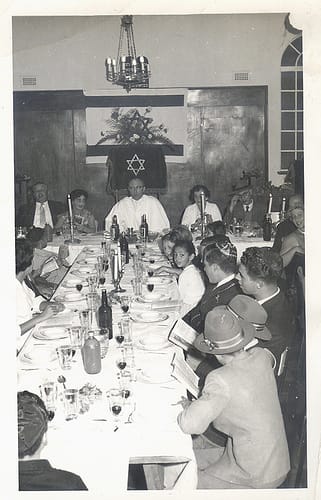Rabbi Ehrman was a Real Mensch

Communal Seder 1960. Rabbi Ehrman flanked on L by Freda and Morris Teperson, on R by Hanna and Ruben Sloman. Far R Zuky Fine. Nearest camera: Albert and David Hatchuel, Barry Rest, Brian Hirsch, Gillian Schattil, Lucille Keril.
Rabbi Ehrman was a Real Mensch
Que Que’s Jewish community had a history going back to Rhodesia’s inception when Rhodes’ British South Africa Company was granted a charter by the British Government. The first service was conducted in 1905 by a local trader, Mr. H. Liptz with books and scrolls on loan from the Bulawayo congregation.
Rabbi Ehrman was a Real Mensch
Frank Johnson wrote in his memoirs that Rhodes was bitterly disappointed when he first set eyes on Salisbury. But when Johnson pointed out the foundation of a synagogue he kept exclaiming “My country’s alright, if the Jews come, my country’s alright.” (Rhodes financial ally and confidant, who uniquely left his fortune to build an undeveloped colony, was Alfred Beit.)
Although it was obvious by 1938 that Jews were suffering murderous oppression in Nazi Germany, alien immigration was restricted to those with offers of employment at a wage not less than 15 pounds a month with an extra five pounds for each dependent.
After WWII, Sir Godfrey Huggins still imposed an immigration policy stipulating 90% of immigrants be British citizens. Of the 10% foreign immigrants, citizens of one country could comprise no more than 10% of the foreign quotas or 1% of all entries.
Despite these limitations the tiny Jewish community grew. In 1952 Que Que acquired a permanent Community Hall followed by neighboring Gatooma in 1954. Gwelo’s Sephardic and Ashkenazi communities were divided but some never-the- less joined forces on High Holy Days.
It was not until 1959 that the three communities were blessed with the arrival of Rabbi Ehrman, his wife, Ibi, and and their two children, Yetta and Isaac, from Israel.
Life was good. Business opportunities were booming. But quiet, unassuming Rabbi Ehrman and Ibi reminded everyone that Israel was their insurance policy. He encouraged the youth to identify with Israel with visits, and study there with Aliya the ultimate goal.
Rabbi Ehrman, was Czech, orphaned at seven and brought up by his elder brother in Switzerland. He joined the French Resistance in France smuggling Jews across the Pyrenees into Spain. Captured by Franco’s army he was imprisoned. After British rescue he joined the Czech Brigade of the British Army under General Montgomery and crossed the Channel on D-Day with the artillery unit.
After the war newly married to Ibi, an Auschwitz survivor, they made Aliya together illegally to Palestine. They collaborated in the sinking of the ship in Haifa rather than be shipped to Cyprus.
By 1962 political troubles clearly loomed in Rhodesia. The Federation was being dismantled, caught in Britain’s Winds of Change sweeping down Africa. Once again Jews were feeling insecure with White and Black nationalism on the rise. The next phase of the Diaspora was already underway.
Although the Ehrmans were in Que Que for only 3 years before returning to Israel, the bond was great. Over the decades many of the Que Que youngsters he knew camped out at their house in Israel, like my brother Brian in 1967 following the call on the outbreak of the Six Day War, and later Morris Sloman. Many stayed in touch and brought their families in later years. My parents visited as they considered making Aliya themselves, in the late seventies.
Que Que’s Jewish Community Hall became a Hindu Temple.
Many thanks to Yetta Harnik (nee Ehrman) in Israel for the wonderful photographs and correspondence, and to Gillian Midgen (nee Schattil) in Seattle for all the contacts. She has a rollerdex to die for!
